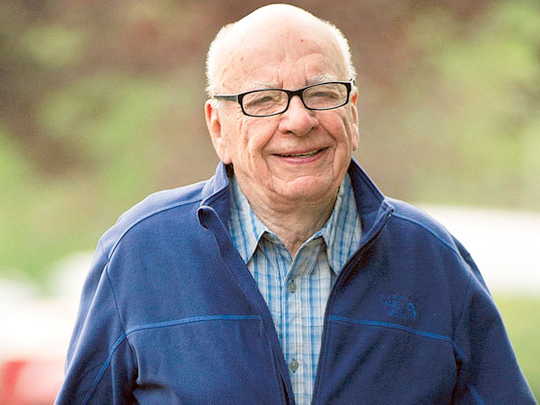
Melbourne/Sydney: Rupert Murdoch, Kerry Stokes and James Packer have veered from allies to bitter enemies over the years as each jockeyed to expand their Australian media empires. The three billionaires are at it again.
Murdoch’s News Corp and Stokes’s Seven Group Holdings are jostling for greater control of Foxtel, Australia’s largest pay-TV company with about $3 billion (Dh11 billion) in annual revenue. A prolonged battle between the two could frustrate an effort by Packer, the 44-year-old scion to the family media dynasty, to raise about A$1 billion (Dh3.7 billion) to help finance a fight for Sydney’s only casino operator.
“It’s not just business,” said Justin Diddams, an analyst at Citigroup in Sydney. “Both Packer and Murdoch will have long memories if Stokes foils or stalls this transaction for them.”
Foxtel would be a crucial asset for either Stokes, who’s 71 and worth about $1.5 billion, or Murdoch, who’s 81, worth about $9.2 billion and seeking to split his company into entertainment and publishing units. The country’s competition regulator considers Foxtel a “near monopoly,” accounting for almost all the revenue in Australia’s subscription-TV market. That market will grow three times as fast as free-to-air TV in the country through 2015, according to PricewaterhouseCoopers.
Murdoch started the action on June 20 when News Corp bid A$2 billion for Consolidated Media Holdings. Its 25 per cent stake in Foxtel would effectively give News Corp control of the pay-TV company when combined with Murdoch’s existing 25 per cent holding.
‘Immense trouble’
Stokes, who runs a $2.2 billion media and construction equipment empire, countered two days later, seeking regulatory permission to buy the 76 per cent of Consolidated Media that his Seven Group doesn’t already own. He has yet to announce a formal offer. Stokes’s 67 per cent stake in Seven Group is valued at A$1.41 billion, based on Wednesday’s closing price.
Australia’s competition watchdog is scheduled to rule by August 2 on whether Murdoch or Stokes would be allowed to buy Consolidated Media.
Stokes won’t easily sell his stake, said Harold Mitchell, executive chairman of strategy firm Aegis Media Australia and a friend of both Stokes and Packer. “Stokes has gone to immense trouble building his position in the media,” said Mitchell. “Our pay-TV system is still underdeveloped and Stokes has children to think about.”
Simon Francis, a Sydney-based spokesman for Seven Group, declined to comment on the transactions, as did News Corp spokesman Stephen Browning. Packer’s Sydney office did not reply to two emails and two telephone calls seeking comment.
Humble beginnings
Stokes has built a reputation as a shrewd and unpredictable corporate player, using acquisitions and boardroom coups to parlay a property business in Western Australia’s capital Perth into Seven Group. The company owns a third of Australia’s biggest free-to-air TV station, Seven Network, as well as magazines, newspapers, Caterpillar dealerships stretching from Sydney to Beijing, and a stake in China’s third-largest lender.
Born in 1940 to an unmarried barmaid in wartime Melbourne, Stokes said in a 2010 interview with the Sydney Morning Herald that he was adopted and left school at 14 — at a time when Rupert Murdoch was already running his father’s newspaper business and Packer’s father Kerry was the second-in-line to one of Australia’s largest media empires.
In 1995, he took control of Seven Network by assembling a 20 per cent stake and pushing to fire two successive chairmen and install himself instead.
Breakaway league
Showing little reluctance to confront the country’s existing media empires, Stokes’s Seven Network in 2002 sued 22 separate companies including divisions of News Corp and the Packer family’s Publishing & Broadcasting, accusing them of conspiring to block him from Australia’s pay-TV market.
Federal Court Judge Ronald Sackville estimated that the damages claimed were worth barely more than the A$200 million of legal costs Seven incurred over the unsuccessful five-year litigation. In dismissing the suit in 2007, Sackville said Stokes is “extremely resolute and persistent in pursuit of his and Seven’s business objectives, sometimes to the point of obstinacy.”
The Packer and Murdoch dynasties have squabbled too. When Murdoch started Foxtel in the 1990s, he found himself locked out of sporting content due to Kerry Packer’s hold on the rights for the Australian Rugby League, the most popular winter football game in Sydney. Murdoch responded by helping form a breakaway league in 1997.
‘Truce’ declared
At other times, the three men have been cosy. Murdoch and Kerry Packer reached a truce after just one season of the rival rugby leagues, uniting the contests and giving Murdoch pay-TV access to games. Packer was allowed to buy the 25 per cent stake in Foxtel that is the centre of the current tussle.
A loan from News Corp also allowed Stokes to buy his first major media asset, the Canberra Times newspaper, from Kerry Packer, according to a 1996 government report. Murdoch’s nominee to Seven’s board also backed Stokes’ 1995 bid to remove the then-chairman, the report said.
More recently, James Packer allowed Stokes to invest alongside him in Consolidated Media in a series of acquisitions in 2008 and 2009, and Stokes’s son Ryan now sits with Packer on the company’s board. The pair have declared a “truce” after their courtroom pay-TV battles, said Mark McDonnell, an analyst at BBY in Sydney.
Echo battle
That truce isn’t helping Packer for now. Worth about $4.1 billion, Packer has agreed to sell his 50 per cent of Consolidated Media to News Corp, bringing an end to the media empire his family built over four generations. A Stokes bid could delay any sale of Consolidated Media, while Packer is in the midst of a battle with Lim Kok Thay, chairman of Genting Bhd, a Malaysian leisure and gaming company, for greater control over casino operator Echo Entertainment Group.
“If he wants to fund an Echo transaction, he’s going to have a problem if he can’t get the funds in time,” McDonnell said of Packer.
Stokes’s finances would be tested in a duel for Consolidated Media. His company’s net debt has more than doubled to A$1.9 billion in the 12 months through June 30, according to the consensus of three analyst estimates collected by Bloomberg, as it spends on equipment to meet a mining boom. Meanwhile, sluggish advertising revenue helped slice 31 per cent off the combined market value of his stakes in Seven West Media and Consolidated in the year through June.
Those troubles suggest Stokes’ bid for Consolidated could be a “green-mailing exercise” to get a higher offer from Murdoch, said BBY’s McDonnell.
Sports content
Murdoch’s A$3.50-a-share bid is below Consolidated Media’s value of A$3.80 to A$4, estimated Peter Stamoulis, an analyst at Evans & Partners in Melbourne. Consolidated Media closed at A$3.38 on Tuesday in Sydney.
Another option for Stokes would be to negotiate sweeter sports content deals from Murdoch to benefit Seven Network, said Jeremy Hook, investment director of TMS Capital in Sydney. A successful bid for Consolidated would give News Corp full ownership of the Fox Sports network in Australia, with broadcast rights to the most popular games of the Australian Football League and National Rugby League.
“This is a strategic asset for Stokes now,” Hook said. “I just don’t know that money alone will be enough for him.”












